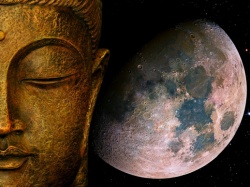Difference between revisions of "Yogini"
m (Text replacement - "self-mastery" to "self-mastery") |
|||
| Line 2: | Line 2: | ||
[[Yogini]] ([[Sanskrit]]: [[योगिनी]], [[yoginī]], IPA: [ˈ[[joɡiːni]]ː]) is the complete [[form]] source [[word]] of the {{Wiki|masculine}} [[yogi]]- and neutral/plural "[[yogin]]." Far from being merely a [[gender]] tag to all things [[yogi]], "[[Yogini]]" represents both a {{Wiki|female}} [[master practitioner]] of [[Yoga]], and a formal term of [[respect]] for a category of {{Wiki|modern}} {{Wiki|female}} [[spiritual]] [[teachers]] (in both [[hinduism]] and [[buddhism]]) in eastern countries such as [[India]], [[Nepal]], and [[Tibet]]. | [[Yogini]] ([[Sanskrit]]: [[योगिनी]], [[yoginī]], IPA: [ˈ[[joɡiːni]]ː]) is the complete [[form]] source [[word]] of the {{Wiki|masculine}} [[yogi]]- and neutral/plural "[[yogin]]." Far from being merely a [[gender]] tag to all things [[yogi]], "[[Yogini]]" represents both a {{Wiki|female}} [[master practitioner]] of [[Yoga]], and a formal term of [[respect]] for a category of {{Wiki|modern}} {{Wiki|female}} [[spiritual]] [[teachers]] (in both [[hinduism]] and [[buddhism]]) in eastern countries such as [[India]], [[Nepal]], and [[Tibet]]. | ||
| − | In the [[Hindu]] [[tradition]], mother is first [[guru]] ([[teacher]]) and in the [[Yoga]] [[tradition]], proper [[respect]] of [[Yoginis]] is a necessary part of the [[path to liberation]]. A [[Yogini]] is the [[sacred]] {{Wiki|feminine}} force made [[incarnate]]: the [[goddesses]] of [[mythology]] ({{Wiki|Lakshmi}}, [[Parvati]], {{Wiki|Durga}}, [[Kali]]) as well as the ordinary [[human]] woman who is [[enlightened]], both having exuberant [[passion]], [[spiritual]] [[powers]] and deep [[insight]], capable of giving [[birth]] to [[saints]], peacemakers, and [[Yogis]]. In the {{Wiki|initiatory}} [[traditions]] of both [[yoga]] & [[shamanism]], | + | In the [[Hindu]] [[tradition]], mother is first [[guru]] ([[teacher]]) and in the [[Yoga]] [[tradition]], proper [[respect]] of [[Yoginis]] is a necessary part of the [[path to liberation]]. A [[Yogini]] is the [[sacred]] {{Wiki|feminine}} force made [[incarnate]]: the [[goddesses]] of [[mythology]] ({{Wiki|Lakshmi}}, [[Parvati]], {{Wiki|Durga}}, [[Kali]]) as well as the ordinary [[human]] woman who is [[enlightened]], both having exuberant [[passion]], [[spiritual]] [[powers]] and deep [[insight]], capable of giving [[birth]] to [[saints]], peacemakers, and [[Yogis]]. In the {{Wiki|initiatory}} [[traditions]] of both [[yoga]] & [[shamanism]], self-mastery of {{Wiki|sexual}} [[energy]] within a [[moral]] code of [[sacred]] {{Wiki|sexuality}} for both females and {{Wiki|males}} (as [[monastic]] [[sannyasins]] or as [[householder]] [[brahmacharis]]), as opposed to merely [[yoga]]-[[asanas]]. |
Numerous great [[yoginis]] and {{Wiki|female}} [[mystics]] are mentioned in the [[Vedas]]; in fact, many of the {{Wiki|vedic}} [[rishis]] were [[yoginis]], [[rishikas]]. In classical [[Sanskrit]] {{Wiki|literature}}, [[Yogini]] is the [[name]] of a class of {{Wiki|female}} [[tantric]] {{Wiki|sorceresses}} in the train of {{Wiki|Durga}}, sometimes enumerated as 60, 64 or 65 ([[Harivaṃśa]], [[Kathāsaritsāgara]]). | Numerous great [[yoginis]] and {{Wiki|female}} [[mystics]] are mentioned in the [[Vedas]]; in fact, many of the {{Wiki|vedic}} [[rishis]] were [[yoginis]], [[rishikas]]. In classical [[Sanskrit]] {{Wiki|literature}}, [[Yogini]] is the [[name]] of a class of {{Wiki|female}} [[tantric]] {{Wiki|sorceresses}} in the train of {{Wiki|Durga}}, sometimes enumerated as 60, 64 or 65 ([[Harivaṃśa]], [[Kathāsaritsāgara]]). | ||
Latest revision as of 09:08, 9 February 2016
Yogini (Sanskrit: योगिनी, yoginī, IPA: [ˈjoɡiːniː]) is the complete form source word of the masculine yogi- and neutral/plural "yogin." Far from being merely a gender tag to all things yogi, "Yogini" represents both a female master practitioner of Yoga, and a formal term of respect for a category of modern female spiritual teachers (in both hinduism and buddhism) in eastern countries such as India, Nepal, and Tibet.
In the Hindu tradition, mother is first guru (teacher) and in the Yoga tradition, proper respect of Yoginis is a necessary part of the path to liberation. A Yogini is the sacred feminine force made incarnate: the goddesses of mythology (Lakshmi, Parvati, Durga, Kali) as well as the ordinary human woman who is enlightened, both having exuberant passion, spiritual powers and deep insight, capable of giving birth to saints, peacemakers, and Yogis. In the initiatory traditions of both yoga & shamanism, self-mastery of sexual energy within a moral code of sacred sexuality for both females and males (as monastic sannyasins or as householder brahmacharis), as opposed to merely yoga-asanas.
Numerous great yoginis and female mystics are mentioned in the Vedas; in fact, many of the vedic rishis were yoginis, rishikas. In classical Sanskrit literature, Yogini is the name of a class of female tantric sorceresses in the train of Durga, sometimes enumerated as 60, 64 or 65 (Harivaṃśa, Kathāsaritsāgara).
Female power here denotes balance. In her book Passionate Enlightenment: Women in Tantric Buddhism, scholar Miranda Shaw writes that a large number of women like Dombiyogini, Sahajayogicinta, Lakshminkara, Mekhala, Kankhala Gangadhara, Siddharajni, and others, were respected yoginis and advanced seekers on the path to enlightenment.
In the Tibetan Buddhism and Bön tradition, a female practitioner is known as a ngagma (see ngagpa), and in the Drikung Kagyu school of Buddhism, togdenma (Tenzin Palmo). These married tantric practitioners are required to devote significant time to retreat and spiritual practice. Ngagma are particularly known for performing birth rituals, weddings, funerals, divinations, and pacification of spiritual disruptions. Some ngagmas are comparable in practice to the Mahasidda yoginis of Indian Buddhism.
